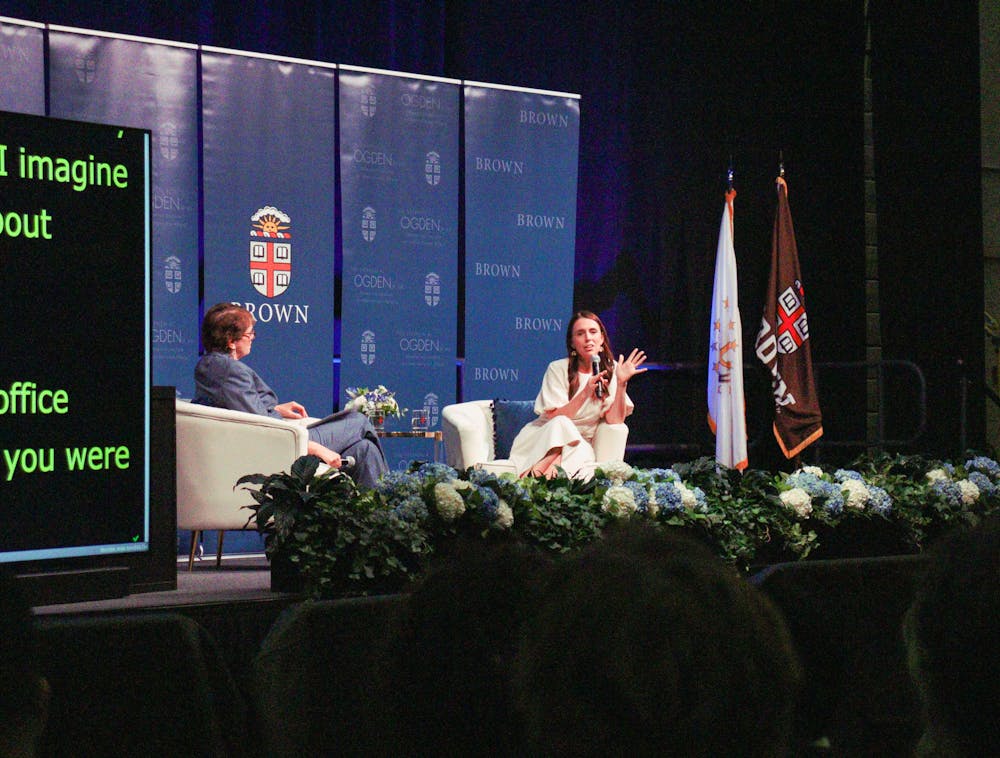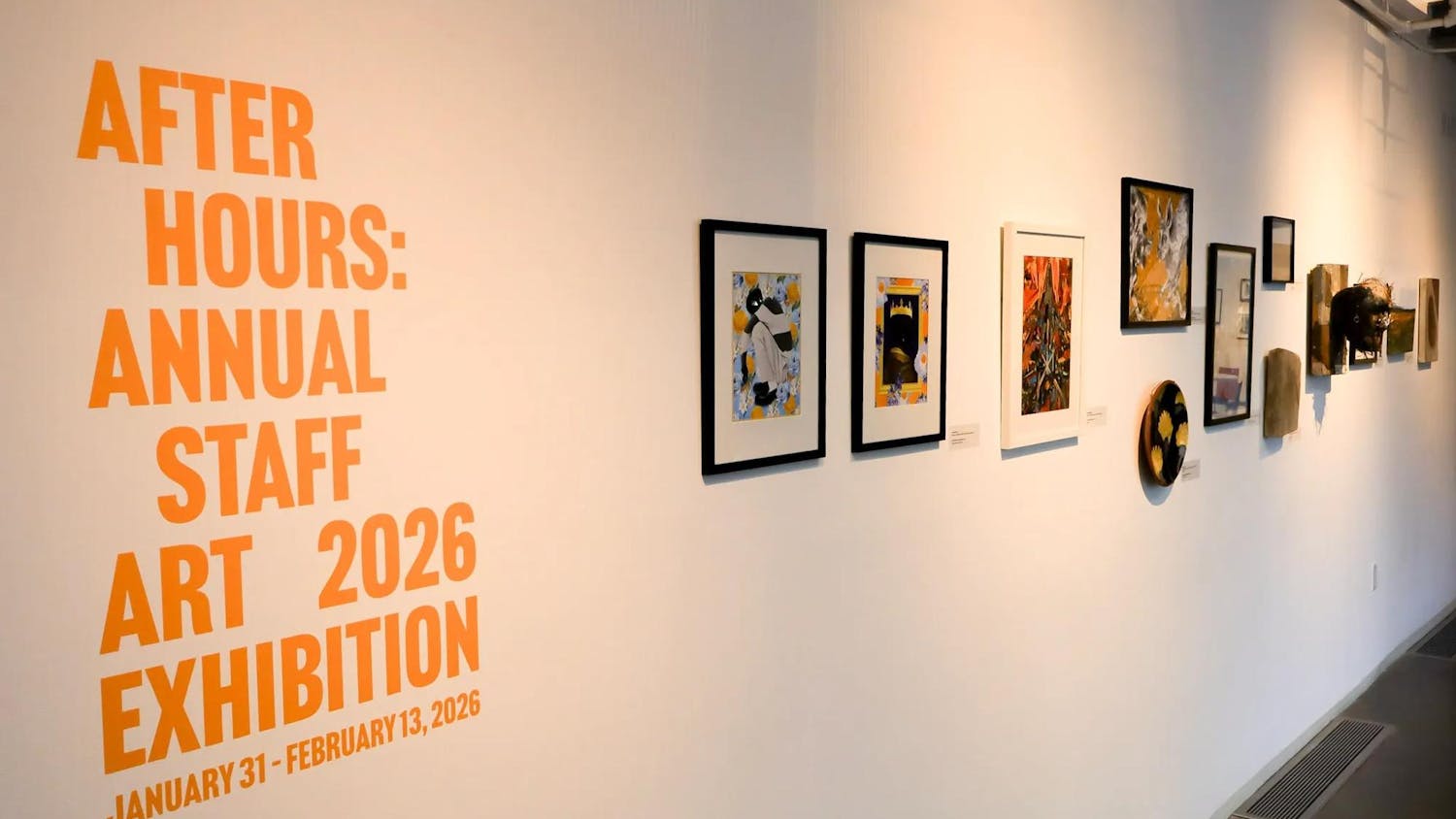Jacinda Ardern, the former prime minister of New Zealand, captured the attention of staff, students and community members as she reflected on her time serving in public office in a Thursday lecture. In the Pizzitola Sports Center, a crowd gathered to hear her speak at the 102nd Stephen A. Ogden Jr. ’60 Memorial Lecture on International Affairs.
While leading through the COVID-19 pandemic, an Islamophobic mass shooting and the looming climate crisis, Ardern still managed to maintain her optimistic attitude through her tenure.
Ardern was adamant that she never intended to become prime minister. Before her professional career, she was involved in student government during secondary school, implementing changes to the uniform dress code. Early in her career, she worked for former PM Helen Clark and had a close-up look “observing her as a prime minister.”
Working as an aide reaffirmed her feelings that “not only was being a member of Parliament not for me, being prime minister was for no one.” She left New Zealand soon after.
But Arden later had a change of heart and re-entered Kiwi politics, winning election to Parliament in 2008. As she climbed the ranks of leadership, she remained assured that she had no desire to become the PM. Then the leader of her party, Andrew Little, resigned seven weeks before the general election, leaving her to lead the party and assume the position of prime minister.
“There was not a day when I woke up and I thought ‘I should be prime minister,’” she said. “I woke up one day, and I was prime minister.”
Assuming office in 2017, Ardern faced no end to challenges that caused self-doubt.
In March 2019, a gunman opened fire in two New Zealand mosques, killing 51 people. The massacre was live-streamed on Facebook and subsequently circulated on other platforms.
Ardern described a national period of “complete shock, grief and disbelief” before the country quickly moved onto “a state of anger.” Briefed by government officials, she learned that the guns used in the shooting were obtained legally.
“I remember just feeling sick when I heard that,” Ardern said. But she decided to seize the moment and make change. Working with members of all parties, New Zealand outlawed all military-style semiautomatic weapons and assault rifles.
One year later, the COVID-19 pandemic rapidly spread around the world. In response, Ardern and her government shut down their borders to prevent the spread.
Ardern emphasized the need for transparency about what they did and didn’t know about the virus as they worked to address it.
“Conceding that we had knowledge gaps wasn’t just the truth,” she said. “It was a critical path to building trust.”
Under her leadership, citizens were only under lockdown for approximately 70 days. Still, her first reaction when the vaccines arrived was: “Now it gets hard.”
“Over 90% of our population was vaccinated,” Ardern said. But a vocal minority resisted the vaccines. “There’s no question that disinformation played a role,” she said.
Subsequently, the former PM’s focus turned to a topic she still studies: misinformation. “Humans are so inclined to form natural tribes,” Ardern said. “My optimism tells me that creating a sense of tribalism can be used negatively, but it can be used for good too.”
Fear “is one of the quickest and easiest pathways to blame” in a politician’s toolbox, she said. “I do not believe that people’s natural instinct is to reach for fear and blame.” Instead, Ardern thinks that humanity is predisposed to reach for “hope.”
The climate crisis was also at the top of Ardern’s list of priorities as she focused on the agricultural sector’s emissions. Using coalition building and consulting with industry leaders, her leadership was integral to passing New Zealand’s key climate legislation.
“Human nature often has us resist change,” she said. She cited the collaborative creation of policies as key to the act’s adoption.
Ardern described herself as riddled with doubt about her leadership abilities. “I thought I was too sensitive,” she said. “I didn’t think I had the competency to do it. I thought that I would buckle under the pressure.”
President Christina Paxson P’19 P’MD’20 also asked her about grappling with imposter syndrome. Ardern recalled a history teacher she admired, describing his struggles with the feeling.
Once she saw her role model struggling with self-doubt, “I saw it everywhere,” she said.
Looking back, she wishes someone had told her that “it’s all going to be OK.”
Despite her doubt, Ardern succeeded. Among her accomplishments were increasing gender diversity in government entities, banning semi-automatic weapons, decriminalizing abortion, extending paid parental leave, supplying free menstrual products in all schools and cutting greenhouse gas emissions, among a slate of others.
“You have no idea what you’re capable of" until you try, Ardern said. “Leadership can be self-fulfilling.”
Her advice resonated with students in attendance. “She's actually one of the first people to come to Brown that I’ve been truly inspired by,” Carson Bauer ’26 said.
“It’s good that even someone like that has self-doubt and questions,” Andrew Rovinsky ’25 noted.
Ardern closed the discussion by predicting that as students reflect upon their future careers, they may feel forced to perfectly match the personalities of others in their field. In her view, this can cause aspiring leaders to think that they either “won’t succeed or … have to change.”
“Neither of those things can be true,” she added. “We need more people who are willing to carve that fresh path for different styles of leadership.”

Owen Dahlkamp was the managing editor of newsroom on The Herald's 135th Editorial Board, overseeing the paper's news operations. Hailing from San Diego, CA, he is concentrating in Political Science and Cognitive Neuroscience with an interest in data analytics. In his free time, you can find him making spreadsheets at Coffee Exchange.





